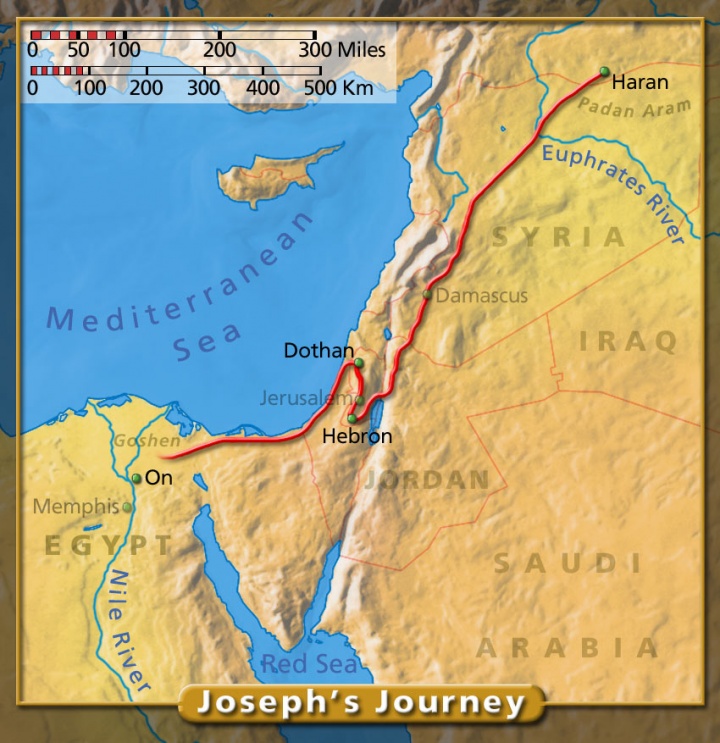Bible Commentary
Genesis 37
Setting Major Events in Motion
Chapter 37 of Genesis details the story of how Joseph’s brothers became jealous and sold him into slavery. Jacob’s favoritism of Joseph is the obvious cause of this jealousy, and the many-colored tunic he gives to Joseph is not well received by the others at all (verse 4). But what seems to be the final straw for the brothers is Joseph’s recounting of his dreams, perhaps with some haughtiness. Not only are the brothers incensed at Joseph, but even his father rebukes him.
As the story eventually unfolds, the dreams come true and Joseph’s family is eventually subject to him. And since the dreams come true, we know that they are no ordinary dreams—they are sent by God as prophecies. Yet the dreams are not only significant for the specific events they foretell, but for their instigation of further circumstances leading to one of the most renowned events in history. For these dreams of Joseph serve as a catalyst that sets in motion events that will not culminate until more than 250 years later with the Exodus from Egypt.
Remember Genesis 15. There God conveyed a prophecy regarding the descendants of Abraham—still called Abram at the time. God told Abram that his descendants would be strangers in a land that was not theirs and, further, that for a time they would be made slaves and afflicted (verse 13). So not only will Joseph’s dreams set in motion events that will enable the family of Israel to survive a future famine, but these same events will provide the means for bringing Israel and his sons to Egypt, where their descendants will eventually be made slaves, become a large nation, and ultimately be delivered in great miraculous power.
So here in Genesis 37, we get a glimpse of how God does His work and how He brings prophecy to pass. He takes an existing situation (Jacob’s favoritism and the resultant family jealousy) and then introduces a new element (Joseph’s dreams) to steer events toward His ultimate plan (Israel to Egypt and the Exodus). In this way, He brings prophecy about, all the while allowing those involved to make their own decisions along the way. It is truly amazing to see His power in action.
Incidentally, though there appears to be some confusion in the chapter as to whether Joseph is sold to Midianites or Ishmaelites, a simple explanation is given in the Jamieson, Fausset & Brown Commentary’s note on verse 25: “a company of Ishmaelites—They are called Midianites (vs. 28), and Medanites, Hebrew (vs. 36), being a travelling caravan composed of a mixed association of Arabians.”
Also of note concerning this passage are facts uncovered by archaeology that argue against the idea that early Bible stories like that of Joseph were made up many hundreds of years after they were supposed to have occurred, as the biblical “minimalists” argue. Notice this from a recent book titled Is the Bible True? by a writer for U.S. News & World Report, Jeffery Sheler:
In Genesis 37:28... Joseph, a son of Jacob, is sold by his brothers into slavery for twenty silver shekels. That, notes [professor Kenneth] Kitchen, matches precisely the going price of slaves in the region during the eighteenth and nineteenth centuries BCE, as affirmed by documents recovered from ancient Mesopotamia and from Mari, in what is now modern Syria. Other documents show the price of slaves rising steadily during later centuries. By the eighth century BCE, the price of slaves, as attested in ancient Assyrian records, had risen to fifty or sixty shekels, and to ninety to 120 shekels during the Persian Empire in the fifth and fourth centuries BCE. If the story of Joseph had been dreamed up by a Jewish scribe in the sixth century, as some skeptics have suggested, argues Kitchen, “why isn’t the price in Genesis also ninety to one hundred shekels? It’s more reasonable to assume that the biblical data reflect reality.” (1999, pp. 73-74)
 UCG.org
UCG.org
Born in Haran; Travels from Hebron; Sold by brothers in Dothan; Taken by caravan to Egypt; Marries a wife from On.
